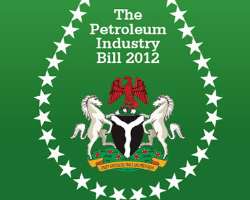ANOTHER LOOK AT PETROLEUM INDUSTRY BILL

It sounds very unfortunate and most regrettable that the new Petroleum Industry Bill before the 7TH National Assembly which ought to have by now form the blue print in the management of oil and gas sector in Nigeria has been unduly politicized and given ethnic coloration by a section of the media. The draft bill which was crafted and harmonized from different versions of the bill (Executive ,Senate and House by senator Udo Udoma led seven-man special PIB task force set up by the minister of petroleum resources Mrs. Diezani Allison Madueke on January 18 this year presents a significant window of opportunity to further redress decades of secretive and ineffective management of oil and gas sector which has impoverished Nigerians rather than being a blessing. Since oil exploration in the country began over half century ago no comprehensive law or legislation has been put in place for the administration of the industry.
Succeeding government in Nigeria has had to grapple with hand- out and pieces of ad- hoc legislation that best suit not only their purpose for administrative conveniences but also that of foreign companies who often dictates the terms of contracts and operations. A further look at the bill shows that the bill would ensure more transparency in the oil sector; Nigerians can own equity in the new National Oil Company and the National Gas Company, there would be mass employment, the nation would earn more revenue, and the management of the oil sector will have enhanced indigenous outlook than the present dominance by foreigners. The PIB also advocates reversal of provisions of prior agreements and contracts, and introduces new fiscal regimes even for old Petroleum Sharing Contracts.
The new PIB therefore seeks to repeal the existing 16 petroleum Acts and replace them with an all encompassing Acts that provides for better fiscal and regulatory management of the oil and gas sector. The new petroleum Industry Bill is an attempt to bring and harmonize under one law various legislation, instruments, institutions and conflicting policies that has govern the petroleum Industry in the country.
Highlights of the draft bill among others is the unbundling of the octopus called the Nigeria National Petroleum corporation NNPC which has been the epicenter of corruption in the country and the proposal to end gas flaring in the nation oil and gas operation in the country. The bill provides for full commercialization of NNPC and creation of other institutions that will ensure restructuring for improved efficiency. The bill also intends to establish rules ,guidelines and procedures that will ensure good governance transparency and accountability in the management and exploitation of oil in the country. Its target is therefore to introduce operational and physical guidelines for efficient management of revenue to enable Nigerian government to retain a higher proportion of revenue accruing through oil industry. The new bill provides a comprehensive document towards domesticating our oil and gas sector, the bill though not exhaustive just like any other human document it suggest an ambitious and integrated guideline in revolutionizing the sector which presently is the major cash cow of the Nigerian economy.
The interest of the host communities were also factored in as it compels the major oil companies to plough back 10% of its net profit towards the development of the community. This pales into significance especially when one considers that the orgy of restiveness in that region is as a result of criminal neglect of the area by both the government and oil companies .For sake of clarity and to allay fears of some misinformed, the 10% host community fund is not deducible from the federation account but rather funded by operating oil companies within a given community. The purpose of the bill is not intended to wrestle operational or exploration power from the oil majors as erroneously circulated but rather to make Nigeria and Nigerians a competitive stakeholders and an equal alliance with the foreign oil companies which will equally offers an opportunity for Nigerian oil firms to benefit from the transfer of technology from their foreign oil company counterpart, after all Nigeria is a sovereign nation and PIB present an important opportunity for Nigerians to exert its sovereignty in the management of its oil and gas sector. The bill also established guidelines for operations both in the down stream and upstream sectors.
In fact, stakeholders, civil society groups and organized labor leaders have argued that the new Petroleum Industry Bill is a landmark opportunity to herald a new era of reform in the oil and gas industry that will maximize Nigeria’s vast potential, restore transparency and facilitate a thriving industry and overall economy. Failure to pass the PIB they say will lead to a reduction of investments in the Nigeria petroleum industry. To date, most of the oil companies have ceased investments in the sector until there is clarity as to what provisions will be contained in the final Bill and how it will affect the industry. With the rise of other attractive petroleum industries in Africa (Angola, Ghana, etc), Nigeria must understand that investments are fungible and will eventually flow to alternative countries that are more receptive.
Lastly, the recent 2012 efforts to deregulate the downstream sector creates an opportunity for lawmakers and other stakeholders to push for the swift passage of this Bill.
The Petroleum Industry Bill has been touted as the most important legislative document of President Jonathan’s administration so far, as it is expected to establish the legal and regulatory framework, institutions and regulatory authorities for the Nigerian petroleum industry; and establish guidelines for the operation of the upstream and downstream sectors.
Written BY Ifeanyi Nwabugu
